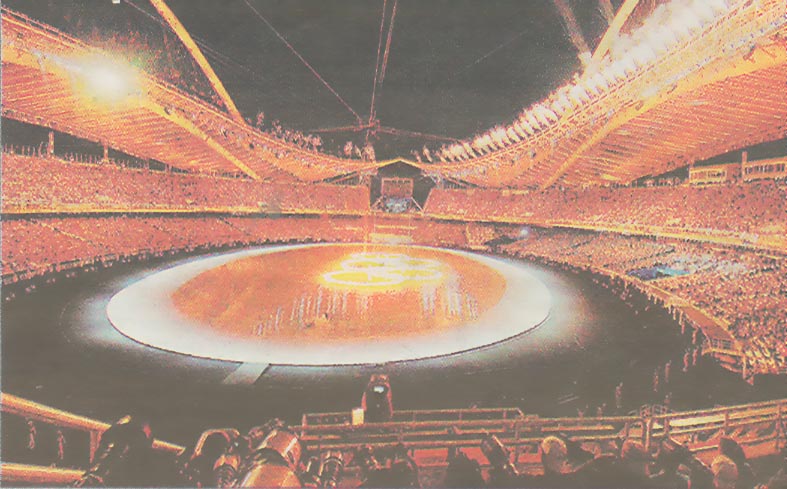 |
|
|
|
|
 August 13, 2004 |
|
|
|
|
13 August 2004: The Olympic Rings are set alight on the surface of an artificial lake in the centre of the OAKA Olympic Stadium during a dazzling Athens 2004 Olympic Games opening ceremony. The inaugural spectacle in front of 75,000 spectators - including over 20,000 journalists and 11,000 athletes - featured a magnificent display of 3,000 years of Greek history and culture, underlining the Games' origins as well as historical background of their undiminished popularity, in both their ancient and modern manifestations. A kilometre-Iong train of floats carrying hundreds of volunteer dancers and actors paraded living motifs inspired by ancient art and history past a packed stadium. The float parade brought out |
 |
|
the entire gamut of Greek myth and history, from Minoan bull-leaping, Hercules' feats and Alexander the Great's imperial campaigns to Greek revolutionary war hero Theodoros Kolokotronis and Karagiozis, the popular underdog of Greek shadow-puppet theatre. Dazzlingly coloured Cycladic and Minoan frescoes were at the head of the parade, followed by black and brick red Geometric vase figures. Then came the Archaic and Classical periods with powdered muscular men posing as Kouroi - monumental statues standing with their hands by their sides - and finally the freer bronze sculpture of Praxiteles depicting athletes in motion. The impressive bandwagon moved quickly through Byzantium, with a passing reference to Emperor Justinian and his Empress Theodora. Towards the end of the parade came the Greek Revolution of 1821, which began to carve a modern Greek state out of the Ottoman empire, featuring national independence fighters in their traditional costumes and fustanellas. Finally came the modern period of popular and high art - ranging from a bouzouki band to the Greek opera diva, Maria Kallas. References to war and religion were pointedly absent. More than 10,800 athletes will compete in the Olympics. |
|
|
(Posting date 18 August 2006 ) HCS encourages readers to view other articles and releases in our permanent, extensive archives at the URL http://www.helleniccomserve.com/contents.html. |
|
|
|
|
2000 © Hellenic Communication Service, L.L.C. All Rights Reserved.
http://www.HellenicComServe.com |
|
